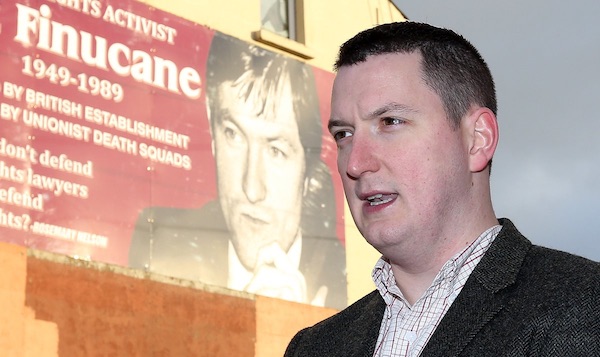
The son of murdered defence lawyer Pat Finucane has welcomed a decision by the Council of Europe to reopen his father’s case at the European Court of Human Rights (ECHR).
The council of 47 European nations, which oversees the implementation of ECHR judgments, has also called on the British authorities to step up efforts to conclude all legacy killing inquests within five years.
John Finucane, Sinn Féin MP for North Belfast, said the decision by the ECHR to reopen examination of the killing of his father was a “hugely significant” move which will support calls for a public inquiry into his father’s murder.
He said: “It’s very unusual for the Council of Europe to reopen an investigation.
“We have been hopeful as a family that they would do that, but we certainly weren’t complacent.
“This is a result of efforts not just by my family but also by the Irish government, and I want to thank them for their efforts in that regard.
“I think what the announcement today does is it puts a level of scrutiny and spotlight on the British government and how they propose to deal with the investigation and all of the circumstances around the murder of my father.”
Pat Finucane represented both republican and loyalist paramilitaries during the conflict. He was shot dead in his family home in north Belfast in February 1989 by the unionist paramilitary UDA. A previous British government has admitted the assassination involved British state collusion.
Asked if the decision makes a public inquiry more likely, Mr Finucane said: “I think it does, because the announcement last November that the British government essentially wanted to bat this back to the PSNI and the Police Ombudsman, I don’t think that really held much water with anybody internationally.
“I think the Council of Europe’s decision today puts focus and scrutiny on that.
“It requires the British government to justify how that decision will live up to the Convention standards. That’s the international human rights standard which the British government are still bound by.
“I think that does draw out the weakness of the British government’s position and I would say it does advance our calls for a public inquiry.”
In November the London government said it would not order a public inquiry into Mr Finucane’s murder “at this time”. It said it could fulfil its legal obligation to carry out an investigation compliant with Article 2 of the ECHR “through a series of processes”, a move which was widely condemned.
The Council of Europe rebuked the British government at the time for failing to enforce judgments by the ECHR involving Crown forces killings and suspected collusion cases in the north of Ireland.
In a statement today, the Council explained its decision to reopen its examination of the Finucane case. It said it did so “in order to supervise the ongoing measures to ensure that they are adequate, sufficient and proceed in a timely manner”.
The Council has invited the authorities to clarify how the ongoing PSNI and Police Ombudsman processes will proceed “promptly and in line with Convention standards”.
It said it “strongly encouraged the authorities to step up their efforts to accelerate as far as possible to meet their target of the conclusion of all inquests within five years”.
It has asked for “concrete information and explanations” as to what measures are being taken to meet the current timeframes and “prevent unnecessary delays”.
While noting the British authorities’ intention to introduce legislation under the Stormont House Agreement to address legacy issues as soon as possible, the Council also outlined its “profound concern” about the lack of detail over a plan to do so.
Sinn Féin’s Michelle O’Neill said she has written to the British government again requesting a full and independent public inquiry into the killing of Pat Finucane.
“That the Council of Europe has deemed it necessary to supervise British legal processes, to ensure that they proceed promptly and in a manner consistent with European Convention legal standards, stands as an international indictment to the British government’s obstructive approach to investigating this killing,” she said.
“The British government must now immediately establish a full and independent public inquiry into the killing of Pat Finucane.
“The Finucane family have campaigned with courage and dignity for over 30 years - they simply want the truth behind the death of a father, husband and brother.
“It is time for the British government to honour its commitments and legal responsibilities, and stop blocking the truth.”
![[Irish Republican News]](https://republican-news.org/graphics/title_gifs/rn.gif)
![[Irish Republican News]](https://republican-news.org/graphics/title_gifs/harp.gif)

